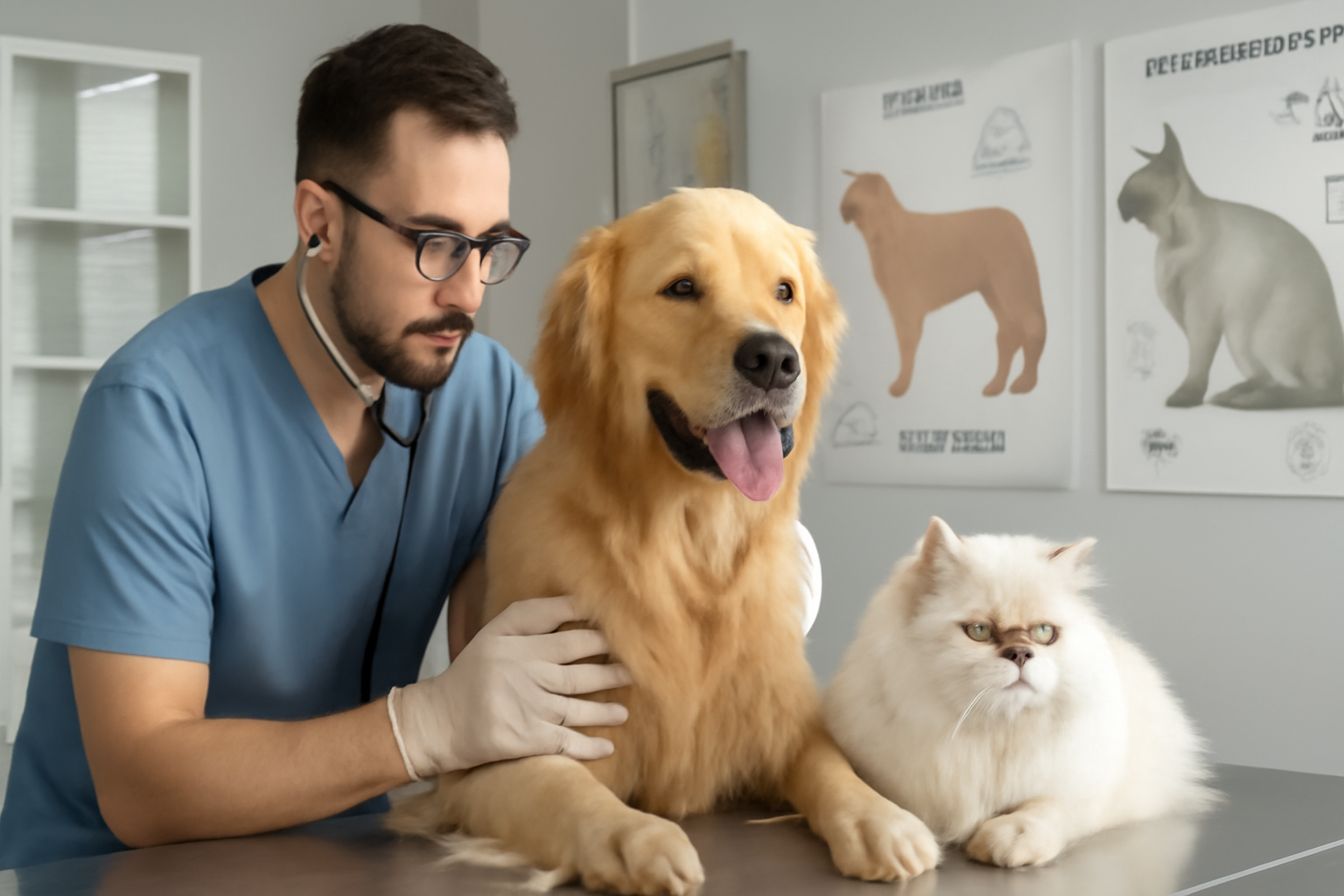Understanding the health issues that can be passed from parents to puppies in different dog and cat breeds helps owners take better care of their pets. Whether you have a small Dachshund, a large St. Bernard, a fluffy Maine Coon, or an elegant Persian, it’s important to know about the health problems they may experience due to their breed. This guide discusses common hereditary issues, prevention methods, how veterinarians identify these problems, and how to better care for your animals.
Why Breed Genetics Matter
Purebred animals often carry genes for health issues because they are bred between relatives and for specific appearances rather than health. Mixed-breed animals have varied genes but can still inherit problems from their parent breeds. Understanding breed health issues helps improve care for these animals.
1. Hip and Spinal Problems: Musculoskeletal Issues
Hip Problems
Hip problems are common in large dogs, such as St. Bernard’s and Newfoundlands, with many of these dogs potentially affected. Special large-breed food, maintaining the correct weight, and engaging in light exercise from a young age can help protect the joints.
Spinal Problems (I VDD)
In small dogs with long backs, like Dachshunds, about 20–25% may have spinal issues. To prevent this, it’s advisable to avoid letting them jump from high places, control their weight, and schedule regular health check-ups.
2. Heart and Circulation Issues
Mitral Valve Disease
Cavalier King Charles Spaniels often have mitral valve issues in their hearts, with over 40% affected by age 5. Early screening and sometimes medication are important.
Dilated Cardiomyopathy
St. Bernard’s and Newfoundlands also present many cases of a condition called dilated cardiomyopathy, which significantly affects these dogs.
Hypertrophic Cardiomyopathy (HCM)
Maine Coon and Rag doll cats have a higher likelihood of developing HCM, making annual heart exams essential.
3. Respiratory and Anatomical Issues
Brachycephalic Syndrome
Dogs with short snouts, such as French Bulldogs, Pugs, and Bulldogs, face breathing difficulties, eye problems, skin irritations, and challenges during childbirth. It’s important to avoid overheating and frequently check their breathing. Responsible breeders are working to improve the health of these dogs.
4. Health Issues in Animals
Syringomyelic
Cavalier King Charles Spaniels often suffer from a condition called syringomyelic, which affects the brain and spine.
Back and Leg Problems
Dachshunds can experience back and leg issues, including I VDD and patellar luxation, and may even have brittle bones.
Muscle Weakness
Maine Coon’s may face muscle weakness and heart problems.
Kidney Issues
Persian cats often have kidney problems known as PKD.
5. Risks of Cancer and Autoimmune Diseases
Cancer in Golden Retrievers
Golden Retrievers can develop cancer, such as hemangiosarcoma and lymphoma, in 20–50% of cases, often before the age of 10.
Osteosarcoma in St. Bernard’s and Newfoundlands
St. Bernard’s and Newfoundlands may also develop osteosarcoma and skin issues.
Screening and Preventive Care
Currently, genetic testing can identify many genetic changes. Veterinarians recommend performing orthopedic exams, cardiac ultrasounds, and breed-specific DNA tests for conditions like I VDD, HCM, or PKD. Mixed-breed dogs can also carry these mutations and benefit from testing.
6. Diet, Exercise, and Environmental Care
Maintaining a healthy weight helps joints and the heart function better, especially in certain breeds. Use joint supplements, engage in light exercise, and prevent the animal from getting too hot or too cold. For cats with kidney or heart issues, avoid foods high in phosphorus and sodium.
7. Behavioral and Lifestyle Changes
Be cautious with stairs, jumping, and rough play for dogs that may experience back or hip problems. Use ramps or low furniture to avoid strain. Schedule veterinary visits together and avoid stressful situations. Animals with heart issues require calm environments and a consistent daily routine.
Condition Comparison Table
| Breed Type | Common Hereditary Conditions | Preventive Actions |
| Small/long-back breeds | I VDD, patellar luxation (e.g., Dachshunds) | Weight control, ramps, avoid jumps |
| Medium/small purebreds | Syringomyelic, MVD (Cavalier King Charles) | Early cardiac screening, gentle exercise |
| Large breeds (Newfoundlands, St. Bernard’s) | Hip dysplasia, DCM, osteosarcoma | Screening, moderate exercise, supplements |
| Brachycephalic breeds | BOAS, skin fold issues | Avoid heat, surgical interventions, responsible breeding |
| Purebred cats (Maine Coon, Persian) | HCM, SMA, PKD | Genetic testing, echo, low phosphorus diet |
| Golden Retrievers | Cancer predisposition | Regular screenings, prompt veterinary visits |
Quick Tips
- Research breed health before adopting or breeding.
- Use tests to assess your dog’s health.
- Maintain your dog at a healthy weight and provide joint supplements.
- Make your home easier to navigate for your dog (ramps, soft bedding).
- Take your dog to the vet for early breed-specific check-ups.
- Choose breeders who prioritize health.
By understanding the health issues each type of dog might have, owners can ensure their furry friends live happy and healthy lives.
